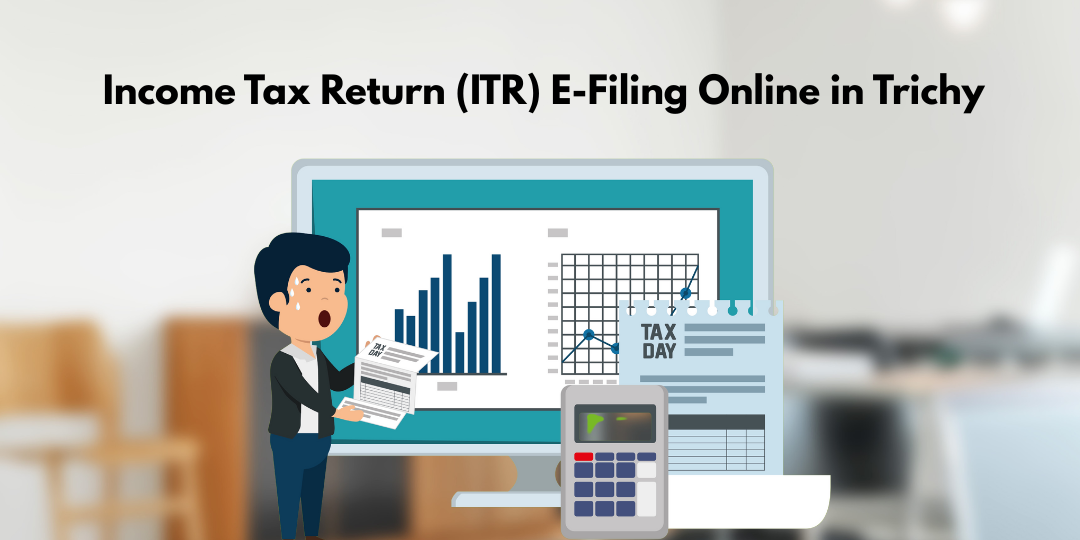
Income Tax Return (ITR) E-Filing Online in Trichy – With Auditor Shiva
Filing your Income Tax Return (ITR) isn’t just about complying with the law—it’s a smart financial habit that unlocks several benefits, from smooth visa approvals to quick loan sanctions. If you’re in Trichy and wondering how to e-file your income tax return easily and correctly, Auditor Shiva is here to make the entire process seamless.
What is an Income Tax Return (ITR)?
An Income Tax Return is a form submitted to the Income Tax Department to report your income, deductions, taxes paid, and any tax refund claim. These returns are filed using forms such as ITR-1 to ITR-7, depending on your income type, taxpayer category, and financial activity.
Who Should File ITR?
Whether you’re salaried or running a business, here’s who needs to file an ITR in India:
- Salaried Individuals: Income exceeds the basic exemption limit.
- Businesses & Professionals: Filing is mandatory regardless of profit/loss.
- Partners/Directors: If you’re a director or partner in a firm.
- Dividend or Interest Earners: Including income from FDs, mutual funds, etc.
- Charitable Trusts & Religious Institutions.
- NRIs & Tech Professionals: Earning income from or in India.
- Individuals Seeking Refunds or who’ve had TDS/TCS deducted.
Basic Exemption Limits (FY 2023-24)
| Age Group | Exemption Limit |
|---|
| Below 60 years | ₹2.5 lakhs |
| 60 to 80 years | ₹3.0 lakhs |
| 80+ years | ₹5.0 lakhs |
Additional conditions like high-value transactions, TDS deductions, or foreign travel can also make ITR filing mandatory—even if your income is below these thresholds.
Types of ITR Forms
| ITR Form | Who Should Use It |
|---|
| ITR-1 | Salaried individuals with income up to ₹50 lakhs from one house property |
| ITR-2 | Individuals with capital gains, foreign income, or more than one property |
| ITR-3 | Business owners or professionals |
| ITR-4 | Presumptive income scheme participants (turnover up to ₹2 cr for business / ₹50L for profession) |
| ITR-5 | Partnerships, LLPs, and associations |
| ITR-6 | Companies other than those claiming exemption under section 11 |
| ITR-7 | Trusts, NGOs, political parties, educational institutions, etc. |
Not sure which one applies to you? Auditor Shiva can help you choose the right form.
ITR Filing Due Dates (AY 2024-25)
- Individuals/Non-Audit Cases: July 31, 2024
- Businesses Requiring Audit: October 31, 2024
- Transfer Pricing Cases: November 30, 2024
- Belated/Revised Returns: December 31, 2024
- Avoid penalties by filing early—late ITR filing can attract fines up to ₹5,000.
Benefits of E-Filing ITR Online in Trichy
- Claim refunds faster
- Carry forward capital losses
- Required for loan/visa applications
- Acts as proof of income & financial health
- Avoid penalties and interest
- Eligible for government subsidies and schemes
Documents Required for ITR E-Filing in Trichy
General:
- PAN Card & Aadhaar (linked)
- Bank Account Details
Income Proofs:
- Salary Slips, Form 16
- Form 26AS (Tax Credit Statement)
- Interest Certificates (FD, savings)
- Capital Gains documents
- Rent Receipts (for HRA)
- Investment Proofs (PPF, LIC, ELSS)
Loan/Tax Saving:
- Home Loan Interest Certificate
- Donations, Tuition Fees, etc.
How to E-File Income Tax Return Online in Trichy
ONLINE METHOD (QUICK & EASY):
- Log in to https://www.incometax.gov.in
- Go to: e-File → File Income Tax Return
- Choose: AY 2024–25 → Individual → Online
- Select correct ITR form (e.g., ITR-1 for salaried)
- Fill & review pre-filled details
- Make tax payment if due
- E-verify return via Aadhaar OTP or net banking
OFFLINE TO ONLINE (FOR ADVANCED FILERS):
- Download ITR utility from income tax portal
- Fill form → Generate XML → Upload to portal
- E-verify your return
Still confused? Leave it to Auditor Shiva’s expert ITR e-filing services in Trichy for hassle-free submission.
Missed the Deadline? Here’s What You Can Do:
- Belated Filing: Allowed till December 31, 2024 (with late fee)
- Updated Return (ITR-U): Revise within 2 years, but subject to additional taxes
- File Today to Avoid: ₹1,000–₹5,000 late fee + 1% monthly interest on unpaid tax
Common Mistakes in ITR Filing
- Wrong ITR Form
- Incorrect PAN or Bank Details
- Missing Sources of Income (like capital gains)
- Forgetting to e-verify the return
- Ignoring eligible deductions under 80C, 80D, etc.
Why Choose Auditor Shiva for ITR E-Filing in Trichy?
- Expert Chartered Accountants
- Fast & Accurate Filing
- Data Privacy & Secure Handling
- Friendly Local Support
- Maximum Refund, Minimum Hassle
Anyone whose income exceeds the basic exemption limit (₹2.5 lakh for individuals under 60) or who has high-value financial transactions, foreign income, business income, or TDS deductions must file an ITR—even if their income is below the threshold.

